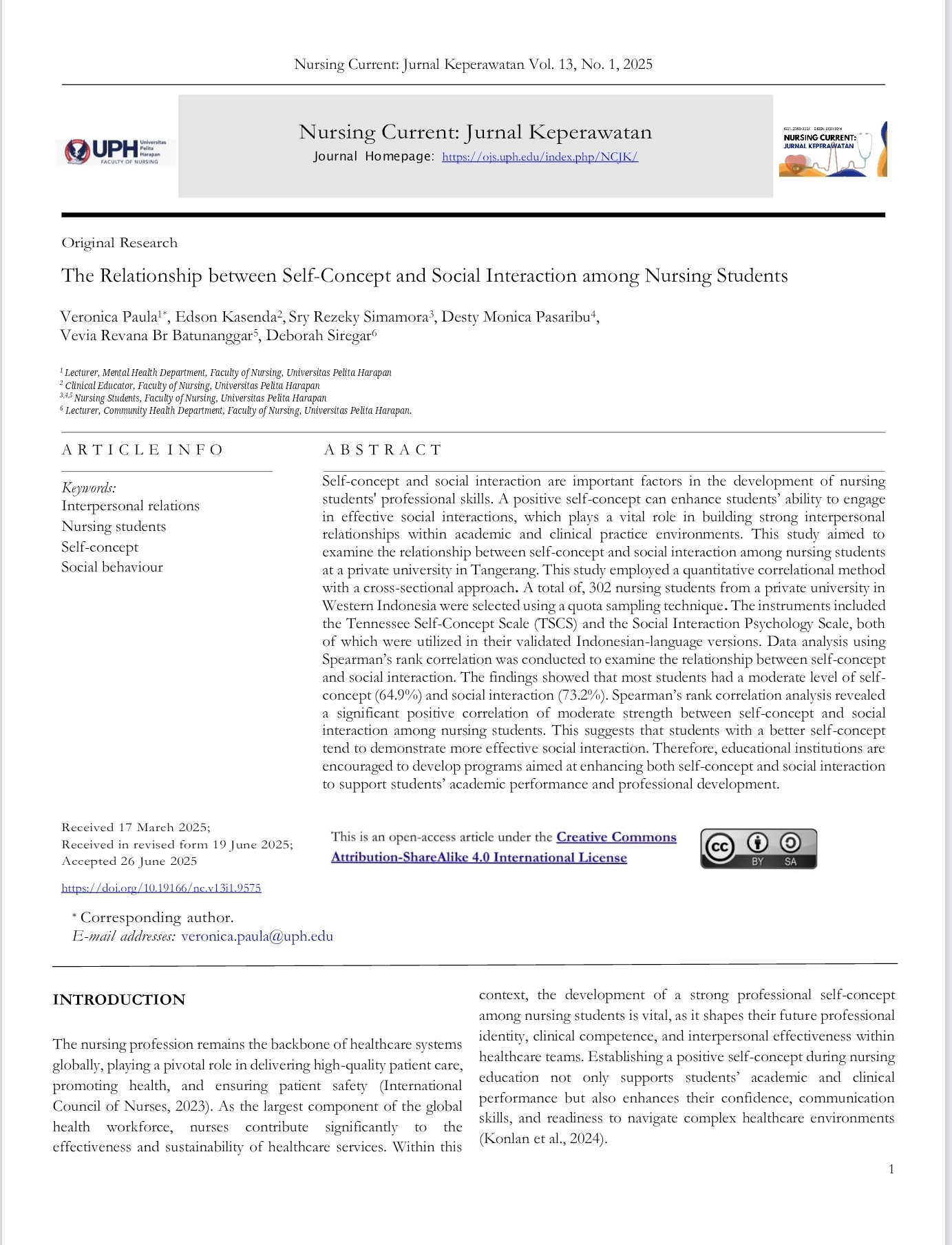The Relationship Between Self-Concept and Social Interaction Among Nursing Students
DOI:
https://doi.org/10.19166/nc.v13i1.9575Keywords:
Interpersonal Relations, Nursing Students, Self concept, Social BehaviourAbstract
Self-concept and social interaction are important factors in the development of nursing students' professional skills. A positive self-concept can enhance students’ ability to engage in effective social interactions, which plays a vital role in building strong interpersonal relationships within academic and clinical practice environments. This study aimed to examine the relationship between self-concept and social interaction among nursing students at a private university in Tangerang. This study employed a quantitative correlational method with a cross-sectional approach. A total of,302 nursing students from a private university in Western Indonesia were selected using a quota sampling technique. The instruments included the Tennessee Self-Concept Scale (TSCS) and the Social Interaction Psychology Scale, both of which were utilized in their validated Indonesian-language versions. Data analysis using Spearman’s rank correlation was conducted to examine the relationship between self-concept and social interaction. The findings showed that most students had a moderate level of self-concept (64.9%) and social interaction (73.2%). Spearman’s rank correlation analysis revealed a significant positive correlation of moderate strength between self-concept and social interaction among nursing students. This suggests that students with a better self-concept tend to demonstrate more effective social interaction. Therefore, educational institutions are encouraged to develop programs aimed at enhancing both self-concept and social interaction to support students’ academic performance and professional development.
References
Abdulsyani. (1994). Sosiologi: Skematika, teori, dan terapan. Jakarta: Bumi Aksara.
Alghtany, S., Madhuvu, A., Fooladi, E., & Crawford, K. (2024). Assessment of academic burnout and professional self-concept in undergraduate nursing students: A cross-sectional study. Journal of Professional Nursing, 52, 7–14. https://doi.org/10.1016/j.profnurs.2024.03.003
Almeida, I. F., Bernardes, R. A., Sousa, L. B., Santos-Costa, P., Silva, R., Bernardo, J., Santana, E., & Rosa, A. (2023). Nursing professional self-concept: A scoping review protocol. Nursing Reports, 13(1), 51–56. https://doi.org/10.3390/nursrep13010005
Azpiazu, L., Ramos-Díaz, E., Axpe, I., & Revuelta, L. (2024). Social support, self-concept and resilience as protectors against school maladjustment during adolescence. School Mental Health. https://doi.org/10.1007/s12310-024-09736-9
Bidjuni, H. (2016). Hubungan kepercayaan diri dengan penyesuaian diri pada mahasiswa baru di Program Studi Ilmu Keperawatan Fakultas Kedokteran Universitas Sam Ratulangi Manado. Jurnal Keperawatan, 4(2), 1–7. https://ejournal.unsrat.ac.id/v2/index.php/jkp/article/view/17612
Burgaz Kınas, S., Bilgiç, Ş., & Paslı Gürdoğan, E. (2025). The relationship between nursing students’ communication skills and their attitudes toward clinical practice: A descriptive and correlational study. Mediterranean Nursing and Midwifery. https://doi.org/10.4274/MNM.2024.24234
Dreidi, M., Abed, D., Salameh, H., Abu Sbeih, I., Asmar, S., Salameh, S., Asmar, I., Yaseen, K., & Al-Mahmoud, O. (2024). The effect of self-esteem on stress and coping mechanisms among nursing students during clinical training in Palestinian universities. International Journal of Practice-Based Learning in Health and Social Care, 12(1), 59–69. https://doi.org/10.18552/ijpblhsc.v12i1.900
Dwinanda, A. (2019). Hubungan antara konsep diri dengan interaksi sosial pada siswa kelas X SMK SMTI Bandar Lampung tahun ajaran 2018/2019 (Skripsi, Universitas Lampung).
Farčić, N., Barać, I., Lovrić, R., Pačarić, S., Gvozdanović, Z., & Ilakovac, V. (2020). The influence of self-concept on clinical decision-making in nurses and nursing students: A cross-sectional study. International Journal of Environmental Research and Public Health, 17(9), 3059. https://doi.org/10.3390/ijerph17093059
García-Pereyra, F., Matute, J., & Argilés-Bosch, J. M. (2023). The relevance of nurses’ self-concept in the social exchange process: A serial mediation model. Management Decision, 61(13), 172–191. https://doi.org/10.1108/MD-07-2022-1015
Gebreegziabher, A., Bitsa, Y., Bahre, W., & Tesfamicale, Y. A. (2025). Perceived anxiety and self-confidence among undergraduate nursing students during clinical practice in selected colleges providing nursing studies in Addis Ababa, Ethiopia, 2023: Prospective observational multicenter cross-sectional study. Annals of Medicine & Surgery, 87(3), 1171–1180. https://doi.org/10.1097/MS9.0000000000002755
Goliroshan, S., Nobahar, M., Raeisdana, N., Ebadinejad, Z., & Aziznejadroshan, P. (2021). The protective role of professional self-concept and job embeddedness on nurses’ burnout: Structural equation modeling. BMC Nursing, 20(1), 203. https://doi.org/10.1186/s12912-021-00727-8
International Council of Nurses. (2023). International Nurses Day 2023 report: Value, protect, respect and invest in our nurses for a sustainable future for nursing and health care. ICN. https://www.icn.ch/system/files/2023-03/ICN_Recover-to-Rebuild_report_EN.pdf
Konlan, K. D., Damiran, D., & Lee, T. W. (2024). Clinical readiness for practice of nursing students: A concept analysis. International Journal of Environmental Research and Public Health, 21(12), 1610. https://doi.org/10.3390/ijerph21121610
Masela, M. S. (2019). Hubungan antara gaya hidup dan konsep diri dengan interaksi sosial pada remaja. Psikovidya, 23(1), 64–85. https://doi.org/10.37303/psikovidya.v23i1.128
Miao, C., Liu, C., Zhou, Y., Zou, X., Song, L., Chung, J. W. Y., Tan, W., Li, X., & Li, D. (2024). Nurses’ perspectives on professional self-concept and its influencing factors: A qualitative study. BMC Nursing, 23(1), 237. https://doi.org/10.1186/s12912-024-01834-y
Moreno-Cámara, S., Da-Silva-Domingues, H., Parra-Anguita, L., & Gutiérrez-Sánchez, B. (2024). Evaluating Satisfaction and Self-Confidence among Nursing Students in Clinical Simulation Learning. Nursing Reports, 14(2), 1037–1048. https://doi.org/10.3390/nursrep14020078
Murillo-Llorente, M. T., Navarro-Martínez, O., Valle, V. I., & Pérez-Bermejo, M. (2021). Using the Reflective Journal to Improve Practical Skills Integrating Affective and Self-Critical Aspects in Impoverished International Environments. A Pilot Test. International Journal of Environmental Research and Public Health, 18(16), 8876. https://doi.org/10.3390/ijerph18168876
Paramitha, D. S., Amaliah, N., & Ariadi, H. (2024). Correlation analysis of self-concept and interpersonal communication among Generation Z nursing students at pre-professional nursing practice. Gaster, 22(1), 57–73. https://doi.org/10.30787/gaster.v22i1.1409
Sarıköse, S., Özkan, A., Cengiz, A., Öngün, B., Koyun, H. C., Doha, N. A., Bağçivan, G., & Şenol Çelik, S. (2024). The opinions and experiences of nursing students, nurses, and patients regarding clinical practices: A mixed‐methods study. Nursing & Health Sciences, 26(3). https://doi.org/10.1111/nhs.13145
Siallagan, A. M., & Ginting, F. M. (2021). Konsep diri mahasiswa program profesi ners di STIKes Santa Elisabeth Medan tahun 2021. JINTAN: Jurnal Ilmu Keperawatan, 1(2), 119–126. https://doi.org/10.51771/jintan.v1i2.51
Suak, A. V. V., Anderson, E., & Manoppo, A. (2023). Konsep diri dengan komunikasi interpersonal. MAHESA: Malahayati Health Student Journal, 3(6), 1546–1557. https://doi.org/10.33024/mahesa.v3i6.10454
Ulfa, U., Zainal, A., Mayasari, R., & Rezki, A. (2022). The relationship between self-concept, interpersonal communication and self-adjustment in students. KnE Social Sciences, 2022(7), 469–475. https://doi.org/10.18502/kss.v7i8.10766

Downloads
Published
How to Cite
Issue
Section
License
Copyright (c) 2025 Veronica Paula, Edson Kasenda, Sry Rezeky Simamora, Desty Monica Pasaribu, Vevia Revana Batunanggar, Deborah Siregar

This work is licensed under a Creative Commons Attribution-ShareAlike 4.0 International License.
Authors who publish with this journal agree to the following terms:
1) Authors retain copyright and grant the journal right of first publication with the work simultaneously licensed under a Creative Commons Attribution License (CC-BY-SA 4.0) that allows others to share the work with an acknowledgement of the work's authorship and initial publication in this journal.
2) Authors are able to enter into separate, additional contractual arrangements for the non-exclusive distribution of the journal's published version of the work (e.g., post it to an institutional repository or publish it in a book), with an acknowledgement of its initial publication in this journal.
3) Authors are permitted and encouraged to post their work online (e.g., in institutional repositories or on their website). The final published PDF should be used and bibliographic details that credit the publication in this journal should be included.

This work is licensed under a Creative Commons Attribution-ShareAlike 4.0 International License.





